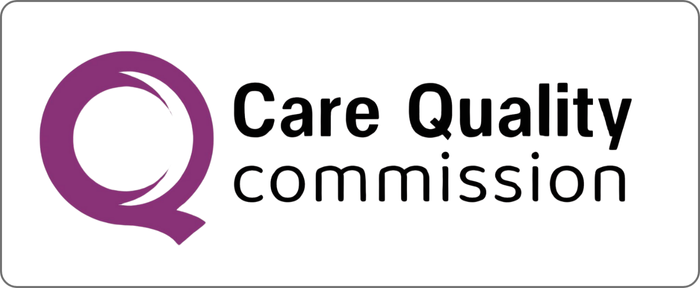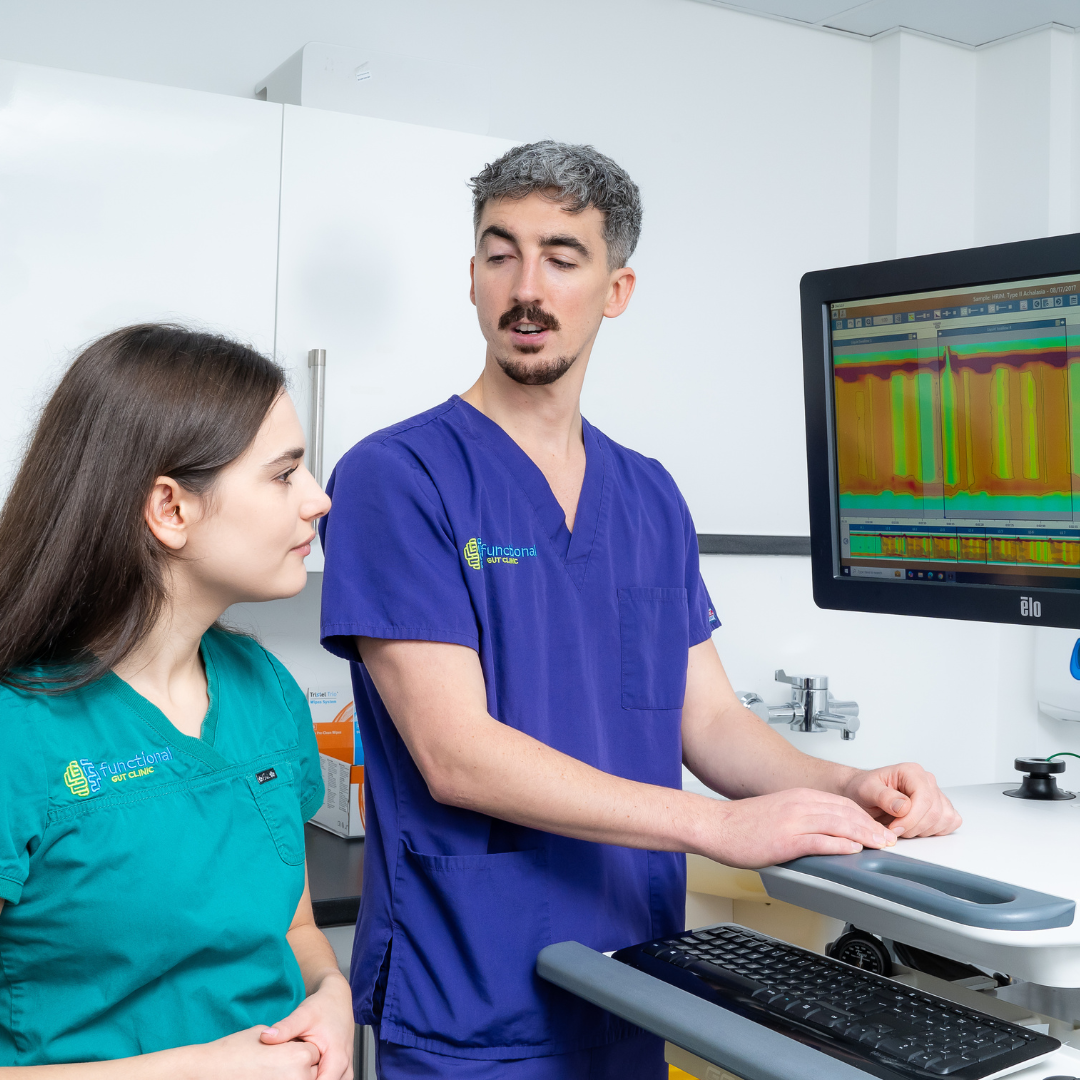Bloating
Struggling with bloating? Here’s what you need to know to find relief.
ALL TEST ARE ACCREDITED & REGULATED BY



What is bloating?
When you’re bloated, your stomach or abdomen can feel full and uncomfortable, or even painful.
This bloating happens when your gastrointestinal tract contains too much gas or air. Bloating can be mild, or more severe, and may present as:
– A visibly distended or swollen abdomen
– Feeling very full and uncomfortable
– Feeling of tightness in the abdomen
– Excess gas – belching and/or flatulence
– Rumbling or gurgling
There are several causes of bloating, so it’s important to diagnose the cause of your bloating and find out why it’s happening to you.

Why does bloating happen?
Prolonged periods of bloating could indicate an underlying health problem, if so you should see your GP.
Possible causes can include:
Irritable bowel syndrome (IBS diagnosis)
Ulcerative colitis, a form of inflammatory bowel disease (IBD), where the inner lining of the large bowel is inflamed and develops ulcers
Crohn’s disease, the other form of IBD, where some parts of your colon are inflamed
Too much bacteria in your small intestine (called small intestinal bacterial overgrowth, or SIBO)
Gastroesophageal reflux disease
Food intolerances, especially lactose or fructose intolerance
Producing too much gas (dysbiosis and fermentation)
Weight gain
Stress or anxiety
Delays in your food and drink moving on from your stomach (called gastroparesis)
Eating too quickly, so that you swallow too much air (called aerophagia)


Diagnosing bloating
Feeling bloated is no fun, but once you know what’s going on you can start to manage your symptoms and the underlying causes.
Testing options:
At the Functional Gut Clinic, we can run the following tests to diagnose the causes of bloating:
Gastric emptying test– which measures how quickly food leaves your stomach
Carbohydrate malabsorption breath test– which finds out if you have certain food intolerances (lactose or fructose)
Small intestinal bacterial overgrowth (SIBO) breath test– which finds out if you have an overgrowth of bacteria in your small intestine (called SIBO)
Oesophageal manometry– which measures the function of your oesophagus (food pipe)
24-hour pH impedance monitoring– which looks at whether you have any reflux
Colonic transit study-a non-invasive test which looks at how long it takes for faeces to pass through your bowl
Learn more about bloating

What Are Proton Pump Inhibitors? Types, Uses & How They Work
Proton pump inhibitors (or PPIs) are a group of medications that decrease stomach acid production. PPIs are the first-line treatment in persistent acid reflux and gastro-oesophageal reflux disease (GERD). PPIs are exclusively available via prescription in the UK.
Taking a PPI can completely stop heartburn symptoms, giving people long-term relief and allowing the stomach and oesophagus to recover. They’re generally not used for acute acid attacks or for rapid relief from an acid attack.
What Are Proton Pump Inhibitors?
Proton pump inhibitors (PPIs) target the “proton pumps” that line the stomach. These pumps move hydrogen ions (H+) into the stomach, thereby increasing the acidity. The more hydrogen ions, the more acidic the stomach is.
Through this direct action, PPIs can provide complete symptom relief for some people with ongoing heartburn, though their effectiveness varies from person to person. By reducing acid exposure, PPIs can also help the oesophagus and stomach heal from long-term irritation.
PPIs aren’t usually prescribed for sudden acid attacks — antacids are better suited for rapid relief. Instead, PPIs are taken as a longer-term therapy to keep acid levels consistently low and prevent flare-ups from happening in the first place.
Types of Proton Pump Inhibitors
Common types of PPIs include:
Omeprazole (Losec)
Esomeprazole (Nexium)
Lansoprazole (Zoton)
Pantoprazole (Protium)
Rabeprazole (Pariet)
All PPIs have the same underlying effect. However, some people may respond better to one over the other or may experience fewer side effects with a particular one. Your doctor will decide which is most appropriate based on your symptoms and medical history.
How Do Proton Pump Inhibitors Work
Your stomach produces acid to help with digestion and to kill germs (bacteria or viruses) entering the body. The acid is highly corrosive — you feel its effects during heartburn. The reason your stomach isn’t irritated is due to the natural mucous barrier that protects it from being eroded away.
Proton pumps might be better termed acid pumps. They move protons or hydrogen ions into the stomach. This lowers the pH and makes the stomach acid much stronger.
PPIs target these pumps, blocking them and preventing hydrogen ions from passing into the stomach. This raises the pH, reducing the strength of the acid. So, if you have backflow from the stomach into the oesophagus, it should no longer cause heartburn and irritation.
When Are PPIs Prescribed?
PPIs are often prescribed due to long-term heartburn-related symptoms. But the underlying cause could be any one of several different conditions. If you’re prescribed a PPI, it could be:
To treat persistent acid reflux or GERD. PPIs are the first-line treatment if you’re experiencing frequent heartburn or acid regurgitation.
To heal stomach or duodenal ulcers. By reducing acid production, PPIs give ulcers the chance to repair.
To manage severe acid-related conditions. Rare conditions like Zollinger–Ellison syndrome cause continuous overproduction of stomach acid and require long-term PPI therapy.
To protect the stomach from other medications. PPIs are often prescribed alongside NSAIDs (like ibuprofen) to prevent ulcers or reflux triggered by these drugs.
How Quickly Do Proton Pump Inhibitors Work?
Proton pump inhibitors work relatively quickly. You should notice some relief within 2-3 days of taking a PPI. However, maximum acid suppression usually builds up after 1-2 weeks of daily use.
Given this slight lag time, PPIs won’t stop heartburn immediately. If you’re having an acute episode, only an antacid can neutralise the acid and provide faster relief.
Side Effects of PPIs
Proton pump inhibitors are considered extremely safe medications. Most people taking PPIs don’t experience any side effects (and if they do, they’re often quite mild).
Common side effects:
Headache
Nausea
Diarrhoea or constipation
Abdominal pain
Flatulence
Less common side effects:
Dizziness
Skin rash
Vitamin B12 deficiency (with long-term use)
Low magnesium levels
Increased risk of gut infections (e.g. C. difficile)
If you’re experiencing any side effects from PPIs, speak to your doctor. It may be that a specific PPI is causing issues. You can change to a different PPI or even swap to an alternative treatment, e.g. an H2 blocker.
Can I Buy PPIs or Do I Need a Prescription?
In the UK, PPIs are only available on prescription. Unlike H2 blockers, you can’t buy PPIs over the counter.
Your GP or specialist may prescribe a PPI either short-term or long-term if you’re dealing with frequent acid reflux, stomach ulcers, medication side effects, or other acid-related conditions. Despite their low side effects, PPIs are strong medications — a prescription ensures they’re used safely and sensibly.
Don’t Ignore Persistent Reflux Symptoms
If you’re struggling with persistent heartburn symptoms, ignoring the problem can cause long-term damage. Factors like diet and lifestyle, including triggers such as spicy food or coffee, can play a significant role in your symptoms. With the right diagnosis, you can receive preventative treatment that safeguards against these consequences.
The Functional Gut Clinic provides specialist testing to identify the underlying cause of your symptoms and advises on the best course of action to take.
Hear from people we’ve helped, just like you.
"Very professional while welcoming and friendly"
"The manner and demeanour of all staff from reception to people carrying out the test was very professional but welcoming and friendly. Atmosphere is very relaxed and all instructions clear and concise."
London Patient

"Highly recommend this"
"Thanks to Dr Hobson and everyone at the Functional Gut Clinic. The whole team is very kind and generous and they are doing things that are cutting edge and they actually get results."
Manchester Patient

"Highly recommend this"
"After stopping my lansoprazole, every time I had a warm drink, I could feel it burn all the way down to my stomach. Thank you to Sam for making me feel at ease." - Manchester Patient

"My experience could not be better"
"Pleasant and knowledgeable staff that made the experience more enjoyable than it should be!" - London Patient

"Very friendly and knowledgeable"
"An excellent service from beginning to end. I would recommend to anyone who was considering having testing done. Very friendly and knowledgeable!" - Manchester Patient

"Very kind and helpful"
"It was also great to have time to talk to the clinicians – very important when you have problems. Reception staff also very kind and helpful." - Manchester Patient

Are you experiencing any other symptoms
Symptoms are often closely connected. Find out more below.
Reflux

Burning mid-chest, worse when bending or lying down
Constipation

Difficulty going to the toilet, unusual stools, often with stomach ache or intestinal cramps, bloating, nausea or appetite loss
Heartburn

A burning pain in your chest, just behind your breastbone.
The pain is often worse after eating...
Regurgitation

Bringing food or drink back up, difficulty swallowing, feeling that food or drink is stuck in your throat, horrible taste in your mouth
Swallowing Issues

Dysphagia - difficulty swallowing, feeling that food or drink is stuck in your throat, horrible taste in your mouth
Diarrhoea

Loose or explosive stools, can’t get to a toilet in time
Abdominal Pain

Cramps; sharp or dull pain, Bloating, Excessive belching, Nausea or vomiting
Faecal Incontinence

Stools leak unexpectedly, Can’t get to a toilet in time
IBS

Abdominal pain or cramping, bloating, changes in bowel habits and urgency, gas

